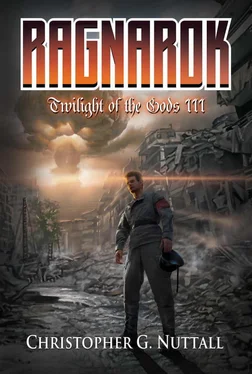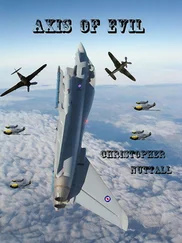Horst nodded. The Waffen-SS’s lines had been shattered, but they were already being pulled back together. It was plausible — quite plausible — that a couple of officers would get lost now , yet that wouldn’t last. The longer they waited, the greater the chance of being asked awkward questions that would lead to certain death. Horst would have liked to go earlier, but without the papers getting through the lines would be impossible. He could only hope the SS hadn’t shot Gudrun out of hand.
They won’t , he told himself, firmly. It was something to cling to. They’ll want to break her first .
He gritted his teeth at the thought. Gudrun wasn’t a common soldier. She certainly wasn’t a common politician . She was an inspiration to hundreds of thousands of people who had been denied the chance to breathe free, denied the chance to speak their minds to their lords and masters. The SS wouldn’t want to kill her; they’d want to turn her against her supporters…
And she might wind up wishing she was dead , he thought. He knew what they’d do to her, just to wear down her resistance before the real pain began. She might even try to kill herself .
He looked at Kurt. Kurt was an infantryman in the Berlin Guard. He hadn’t even seen fighting until the civil war, let alone the true horrors of an insurgency. Kurt had no conception of just what his sister might be going through, no real understanding of what the SS did to those it considered irredeemable enemies…
And if Gudrun is dead when we arrive, Horst promised himself, Karl Holliston will join her shortly afterwards .
“Father,” Kurt said, as the door opened. “Have you come to see us off?”
Horst winced. Herman Wieland looked to have aged twenty years in the last few days, although it was clear that he was holding himself under tight control. He had to be worried, Horst knew; he’d been a policeman, a man of power, yet he hadn’t been able to protect his daughter. His world had shifted on its axis even before Gudrun had been taken prisoner; now, he was clearly unstable, unsure of his place in the world. Horst didn’t really blame him for his doubts. Old certainties were fading everywhere.
“I’m going to the front,” Herman said, quietly. “I just came to say goodbye.”
Kurt stared. “Father!”
“I’m not as old as Grandpa Frank,” Herman said. “I can pull my weight.”
Horst frowned. “Berlin still needs policemen…”
“Berlin needs better policemen,” Herman said, softly. “And I need to do something .”
“You are a good policeman,” Kurt said. “Father, I…”
Horst looked at Herman and felt a sudden wave of sympathy. Herman had been a good policeman, in the eyes of his family, but much of the city would probably disagree. The Ordnungspolizei had been the face of the regime, the iron fist in the iron glove… in many ways, they were more detested than the SS. Herman might not have taken advantage of his position, but far too many other policemen had milked it for all they could get. And now that the regime had fallen, the police were coming under attack.
And there’s a war on , he thought, sourly. The enemy wasn’t that far from the gates. Berlin was practically under martial law. We don’t have time to worry about the police .
“Good luck,” he said. Kurt shot him a betrayed look. “We’ll bring her back.”
Herman gave him a ghost of a smile. “Have many children,” he said. “And name one after me.”
“ Father ,” Kurt protested.
“And you find a wife too,” Herman added. “Someone… someone more suited to the modern world.”
Horst kept his expression under control. Generations of German men — and women — had been raised to believe that a woman’s place was in the home, that the husband and father was the head of the household and his word was law. But Herman’s daughter had triggered a revolution and his wife had started to organise political meetings of her own. He couldn’t blame Herman for being confused, for wanting something else. The world had moved on, leaving him behind.
He still loves his family , Horst thought. But he doesn’t know how to relate to them any longer .
“Yes, father,” Kurt said. “If I make it home, I will find a wife.”
Herman nodded. He looked at Horst for a long moment, then turned and strode out of the chamber. Horst understood, all too well. Herman blamed him. Gudrun wouldn’t have been kidnapped if she hadn’t been with him…
There’s enough blame to go around , he told himself. And none of it is very helpful .
“Get some rest,” he ordered. He glanced at his watch, meaningfully. “It starts getting dark around 1800. We have to get through the lines before then.”
“I understand,” Kurt said. He sounded distracted. “Is he out of his mind?”
Horst bit down a whole string of unhelpful answers. “He was a soldier — an experienced soldier,” he said, finally. It was true. “And we need as many of them as we can get.”
He kept the rest of his thoughts to himself. Herman was fit for his age, but he was no match for an SS stormtrooper. There was no way he’d be able to keep up with the young men for long, although his experience might give him an advantage. But the provisional government was very short of experienced manpower. Herman might be needed, if only to teach lessons to the younger soldiers. They were going to war against one of the most formidable military forces in existence.
And he doesn’t want to come home , Horst thought. The modern world has no place for him .
He shook his head. It smacked of defeatism to him. Giving up was, perhaps, the only true sin. He’d certainly been taught never to give up during basic training. And yet, he understood the impulse all too well. Did he fit into the brave new world any better than his father-in-law?
“Go get some rest,” he repeated. There would be time to worry about the future after Gudrun was rescued and the war was over. “I want to be on our way at 1700.”
“ Jawohl ,” Kurt said.
Berlin, Germany Prime
29 October 1985
“Drink your coffee,” Ambassador Samuel Turtledove said. “There are people down there” — he jabbed a finger towards the window — “who would kill for that cup.”
Andrew Barton nodded in agreement. Berlin was no longer on the verge of starvation, thanks to vast quantities of food being trucked in from the west, but supplies of everything from coffee to baby clothes were running short. The American embassy was about the only place in Berlin, save for a handful of government offices and military bases, where real coffee was freely available. It wasn’t very good coffee, he had to admit, but it was better than the powdered grit Berliners were being served these days.
“I’ve had worse,” he said. “The… slop… I had to drink on the front lines… no wonder the German soldier is so feared.”
Turtledove smiled, then leaned forward. “Washington has been breathing down my neck for a full report,” he said. “What do you make of the war?”
Andrew took a moment to gather his thoughts, sipping his coffee slowly. “I think in some ways we were overestimating the fighting power of the German military,” he said. “And in others, we were underestimating it.”
General William Knox lifted his eyebrows. “You think we were wrong?”
“The Germans haven’t fought a peer power since the final push against Russia, forty years ago,” Andrew said. “We had to use a lot of guesswork when we calculated how the average German division would stack up against its American or British counterpart. And a lot of those guesses might have been wrong.”
Читать дальше












